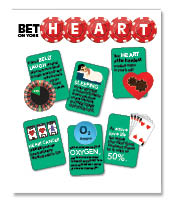Feeling Lucky?
Forget luck. Gambling with your heart is a bet you can’t afford to lose. You’d never place that bet, right? Well, years of bad habits take their toll. And while there are factors beyond your control — like age, ethnicity and family history — there are risk factors you have the power to change. Here are the top five biggest risks you can eliminate.
Stand Pat
According to the U.S. Centers for Disease Control and Prevention (CDC), sitting is perhaps the worst thing you can do for your heart. A CDC report warns 40 percent of Americans are at risk for heart disease because they're inactive. That’s right — you’re nearly twice as likely to develop heart disease if you’re sedentary. It’s not just about exercise, either. You need to move more throughout your day. The CDC is an independent organization that provides health information on behalf of your health plan.
Weigh the Odds
Obesity is a close second, posting a 34 percent risk for heart disease. Being overweight puts additional strain on your heart and raises the chances that you’ll get heart disease. Where you carry the extra weight matters, too. Extra weight around your midsection is particularly risky. Yet dropping just 5 percent of your body weight can lower your risk for heart disease.
Know Your Limits
People think high blood pressure only poses the risk of stroke. But the extra force from high blood pressure also damages arteries and can create scar tissue. This makes the heart work harder just to pump an adequate amount of blood and oxygen throughout the body. And that makes it difficult for blood and oxygen to get to and from the heart itself. If the heart doesn’t get enough oxygen, parts of it can die.
A Game of High-Low
It’s a simple game: Keep your HDL (good) cholesterol high and LDL (bad) cholesterol low. Because high levels of bad cholesterol in the bloodstream can build up in your arteries, eventually causing hardening of the arteries. The effects are similar to those of high blood pressure — inadequate blood flow. The results are similar, too. The heart works harder but gets less blood and oxygen, which can lead to heart attack and death.
No Winners
You know smoking is bad for you. Not only does it damage nearly every organ in your body — the heart, blood vessels, lungs, eyes, mouth, reproductive organs, bones, bladder and digestive organs — the chemicals in tobacco smoke actually harm your blood cells. Smoking also damages the function of your heart and blood vessels. This damage also reduces blood flow.
Stack the Deck
Now that you know the risks, protect your heart. Move more. Lose weight. Manage your blood pressure and cholesterol. Quit smoking. You’ll add years to the life of your heart. You can bet on it!

